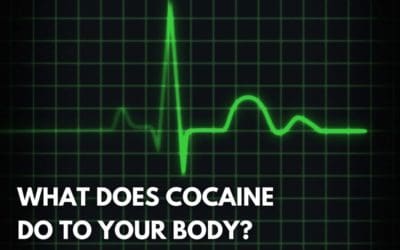Cocaine is one of the most addictive drugs in the world. The effects of cocaine depend on the method of administration. When people snort cocaine, the high peaks around 20-30 minutes after inhalation and will last about 2 hours. When smoked or injected intravenously, the effects of cocaine reach their peak in as little as five minutes, and the high lasts less than an hour.
How Long Does it Take for Cocaine to Kick In?
Depending on how it was consumed, cocaine can take more or less time to get to the bloodstream. Here is how long it usually takes for the effects to kick in depending on how cocaine was consumed:
- Snorted: 1 to 3 minutes
- Rubbed on the gums: 1 to 3 minutes
- Smoked: 10 to 15 seconds
- Injected: 10 to 15 seconds
How long the effects can last also depend on how it was ingested. Here is how the cocaine high usually lasts based on the method of use:
- Snorted: 15 to 30 minutes
- Rubbed on the gums: 15 to 30 minutes
- Smoked: 5 to 15 minutes
- Injected: 5 to 15 minutes
How Long Does Cocaine Affect You?
Cocaine can have lingering effects that can last for up to 2 hours. Cocaine users tend to mix other drugs or with other substances like alcohol. Mixing drugs can extend the cocaine high and can also increase the risk of overdose.
Depending on how it’s consumed, cocaine can start working immediately. But it can also wear off quickly, leading to binge consumption. This extended consumption poses a potential risk to the user’s health. Binge consumption can increase the risk of a stroke or cardiac arrest.
High cocaine consumption can create abnormal heart rhythms, increase blood pressure, and damage the lungs or kidneys.
How long cocaine can stay in a user’s system will depend on several factors. These factors can include how much cocaine has been used, how often it’s used, and how it’s used. Cocaine regularly stays in a user’s system for 1 or 4 days. It can be detected in the urine, blood, saliva, or even hair.
At the Freedom Center, we can assist you with cocaine addiction at our cocaine rehab facility.
What Does Cocaine High Feel Like?
Cocaine is a drug that affects the brain’s activity. It creates an overflow of dopamine, a chemical neurotransmitter that is responsible for our moods and wellbeing.
When cocaine overproduces dopamine, the body enters a euphoric state. People who consume cocaine feel more energetic and talkative. This sudden rush keeps them more mentally alert and sensitive to sound and touches.
However, a cocaine high is shorter when compared to other drug’s effects. And after the cocaine effects wear off, the user is very likely to experience withdrawal symptoms. The cocaine crash can have devastating and lingering consequences on the user’s mood and state. Users can develop problems sleeping, feeling tired, restless, or irritable when they are not consuming.
Cocaine withdrawal symptoms can be highly uncomfortable, which is why people turn to other drugs or higher doses of cocaine to extend its effects.
How Long Does a Crack Cocaine High Last?
Like cocaine, crack cocaine consumption can have damaging effects on the body. How long crack cocaine high can last will depend on different factors like:
- The user’s current health condition
- How long they’ve been using crack cocaine
- The purity of the drug
Some of the immediate effects include:
- Anxiety
- Dilated pupils
- Irritability
- Restlessness
- Tachycardia
- High blood pressure
- Euphoria
- Loss of appetite
Some of the longer-lasting and damaging effects are:
- Agitation
- Nervousness
- Fatigue
- Insomnia
- Other drug cravings
- Fear
- Paranoia
- Depression
Depression is a double-edged sword since some users consume crack or cocaine as a coping mechanism. The more they consume, the more depressed they can feel. Other users start taking cocaine as a weight-loss method. Unfortunately, using cocaine can lead to sleeping disorders and unhealthy behaviors. Consuming will eventually deteriorate their overall health.
Warning Signs of Cocaine Overdose
If you or someone you know is doing coke, it’s important to learn about the signs of overdose. Call 911 immediately if you or someone else experiences any of the early symptoms of overdose:
- Irregular heartbeat
- Difficulty breathing
- Nausea
- Vomiting
- Chest pain
- Hallucinations
- Extreme agitation
- Loss of consciousness
- Seizures
Cocaine highs are intense but short-lived, which is why this powerful stimulant has such a high potential for addiction and overdose. If you’re concerned about your cocaine use or someone else’s cocaine use, please know health is available.
Get Help for Cocaine Addiction
Consider speaking to an addiction specialist or your primary healthcare provider to learn more about addiction recovery and treatment programs. Recovery from addiction is possible; you just need to take the first step. We can assist you through cocaine addiction treatment.


































